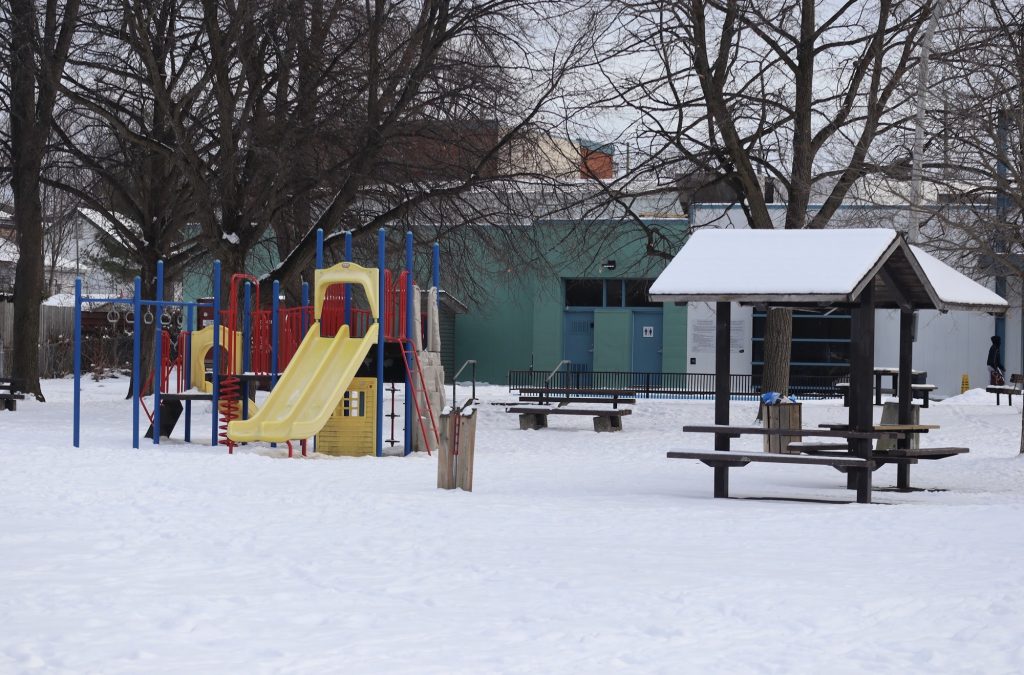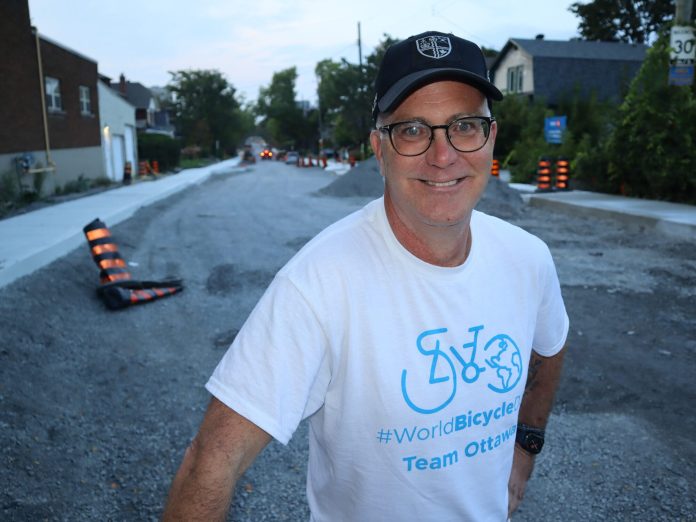There is no shortage of headlines coming out of city hall these days: cutbacks to OC Transpo, debates over how to house asylum seekers, whether or not to build Lansdowne 2.0, the push for a new Sens arena at LeBreton Flats.
The Kitchissippi Times sat down with local Coun. Jeff Leiper to hear what his biggest priorities are for 2025 and what he hopes to achieve this year.
1 – A new refrigerated rink at Lions Park
When the Granite Curling Club moved out of its home on Scott Street for a new development opportunity that would bring two 40-storey towers to the site, the city saw it as an opportunity to reclaim some land that could be used for public greenspace.
“We are reclaiming a significant portion of Lions Park and adding to it with the land that the developer owes us. There is benefits money attached to the project, but the question is whether that benefits money will be enough,” said Leiper. “Thoughout 2025 we want to make sure all the funding will be in place.”
Leiper said both the community and land developer want to see a portion of that space used for a new outdoor refrigerated rink.

2 – Getting the new zoning bylaw right
The City of Ottawa is currently working on a new comprehensive zoning bylaw that would reflect the provincial plan currently in place. It could have far-reaching effects in Kitchissippi — home to more development projects than any other ward, many of which are opposed by the local community associations.
“My goal is to try and find the best balance we can between the need to intensify and preserve, particularly room for greenspace. These days I am less inclined to share concerns around the number of units they go into building, but the envelope needs to provide enough room for trees,” said Leiper.
A 2019 assessment by the City of Ottawa showed that 46 per cent of land in the National Capital Area was covered by trees. Neighbouring Somerset Ward had the lowest tree canopy at about 22 per cent compared to Kitchissippi Ward which was still below the average at 34 per cent. College Ward in Ottawa had the most trees at 48 per cent.
So why should you care?
“In the low-rise neighborhoods particularly, we know the edges of these communities are getting taller. Buildings are going in near the major transit stations and also on Carling,” said Leiper, who also chairs the city’s planning committee. ”The proposal is to add new density in the low-rise neighborhoods as well. We are looking at three and four-storey multi-dwelling buildings that hadn’t been contemplated before.”
3 – Safer roads
Over the last decade, Leiper said he’s pleased the city has been expanding cycling infrastructure, which has included a number of bike lane projects in Kitchissippi, though there is still room for improvement.
“The stretch of Churchill between Byron and Scott, I’d still like to work through this year and next to try and advance cycle tracks there. We are getting a new protective intersection at Byron and Churchill that I think will make it an even more attractive possibility,” said Leiper.
But there are concerns the city could find it more difficult to build new bike lanes. In November, the Doug Ford-led PC government passed a new law which requires municipalities to seek permission from the provincial government to install new cycling infrastructure that removes a lane of traffic. It also said a review would be done to see if any existing lanes should be ripped up, though Ford previously said he wasn’t planning to touch the ones in Ottawa.
“Bike lanes aren’t causing congestion. Too many cars add congestion. Adding bike lanes and giving people alternatives to driving is ultimately how we will address congestion,” said Leiper. “The streets of Kitchissippi will never be less congested than they are now. They will only become worse. The only way we will be able to address that is to improve access to public transit and active transportation.”
4 – More fun in the ward
Before being elected to public office, Leiper was largely involved in local community associations. And through that volunteer work, he helped organize a lot of fun events: the Hintonburg 5K, dog movie nights, the Hintonburg ball hockey tournament.
“I don’t do as many of those anymore. I’d like to, as the city councillor, try to get a bit back to those roots and start creating more events that are fun. There are a lot of challenges in the ward, and I respect that and that it’s often on people’s minds. But I don’t think we’ve been having as much fun as we did before the lockdowns,” said Leiper.
Part of that work could come in the form of ward forums, which Leiper said he’s only organized once since the COVID-19 pandemic. They would provide an opportunity for ward residents to engage in “productive discussion that isn’t always issue focused.”

5 – Advocating for a better budget
The City of Ottawa is strapped for cash. In December it passed a budget with a 3.9 per cent tax hike which many urban councillors felt was not enough to keep up with aging infrastructure.
The budget, worth a total of $5 billion, was voted down by three councillors, one of whom was Leiper.
“We aren’t giving ourselves the financial room we need to give residents things like public washrooms, more exciting public space, more parks, more recreation opportunities,” said Leiper. ”The budget is getting meaner and meaner. It’s frustrating for me as a councillor to hear all the things people think would make a significant increase to their quality of life and basically being able to say we can’t afford that.”
The circumstances this year were particularly difficult because OC Transpo is strapped for cash with a $120 million deficit. To make up for that, transit fares are going up to $4 a ride — a five per cent increase.
On Jan. 27, during a press conference at Bayview Station, a handful of local federal representatives announced $180 million in transit funding between 2026 and 2036. It would pay for upgrading, replacing, modernizing and maintaining public transit and its infrastructure.
But funds still need to come from the province as well. Mayor Mark Sutcliffe, who launched his ‘Fairness for Ottawa’ campaign last summer, said he’s been told it will start flowing if the feds also pitched in. Any possible progress could now be delayed by the provincial election.
While this is optimistic news, Leiper warned catastrophic consequences would come if the city couldn’t rely on upper levels of government.
”We could be faced with some really tough choices. One of those could be service cuts. I will fight service cuts. I was happy to support a package of fare increases and a higher transit levy to avoid that from happening,” said Leiper. ”We don’t want to see OC Transpo in what they call a ‘death spiral,’ especially now that line 2 has opened.”
